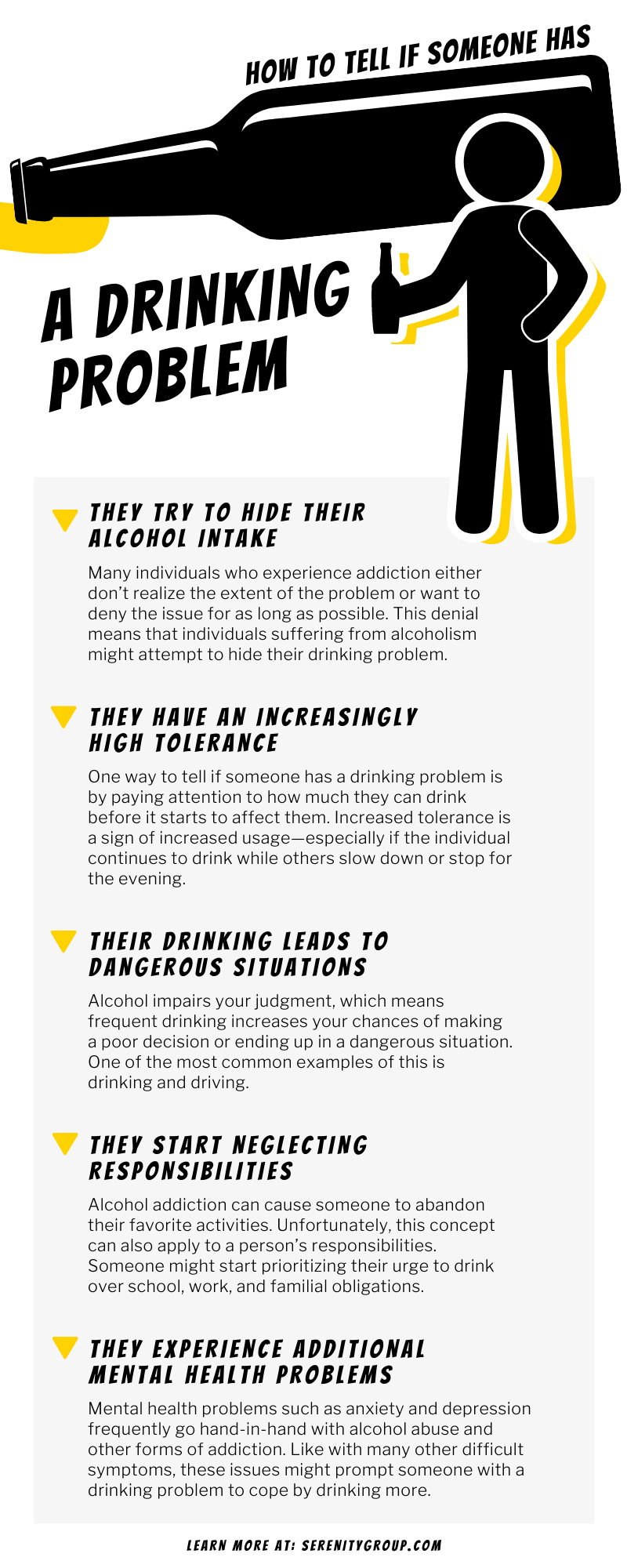How To Tell If Someone Has a Drinking Problem

For many people, alcohol is just a normal part of life. You can have a few drinks with friends, raise a glass to celebrate, and otherwise drink recreationally without posing a risk to yourself and others. For some people, however, drinking alcohol can turn into an addiction that creates serious mental and physical health risks. Because alcohol is such a normal part of adult life, it isn’t always easy to tell when someone’s drinking turns into a problem. Furthermore, alcohol addiction looks different on everyone. It’s important to learn the signs of alcohol abuse so you can keep an eye out for symptoms and address the problem quickly to the best of your ability. To help you take care of yourself and your loved ones, here’s our guide on how to tell if someone has a drinking problem.
They Devote a Lot of Time To Drinking and Recovering
One of the earliest and most certain signs of alcohol abuse is excessive drinking. Keep in mind that it’s not uncommon for someone to drink regularly or even heavily on occasion. While one night of heavy drinking can come with its own risks, it doesn’t necessarily equal a drinking problem. Issues arise when this drinking becomes habitual. If the individual frequently partakes in binge drinking or consistently consumes several drinks a week—usually more than one per day—there’s a good chance they’ve developed an excessive drinking habit. As someone spends more time drinking heavily, they also spend more time recovering from the effects of alcohol. Even if you don’t see your friend or family member drunk all the time, seeing them frequently hungover can also be a warning sign of alcoholism.
They Prioritize Drinking Over Other Engagements
As someone starts drinking more, they may also begin to prioritize alcohol over other hobbies and activities. Addiction creates a strong desire and craving to choose alcohol over other engagements. This might mean turning down social plans—especially ones that don’t involve alcohol—letting go of favorite hobbies, and even missing appointments or other important dates. In addition to losing interest in things they once enjoyed, someone with a drinking problem might also take a hit to their social life as they stop attending events or reaching out to friends. As relationships start to suffer from the issue, the urge to drink can increase, making these problems even harder to deal with.
They Try To Hide Their Alcohol Intake
Many individuals who experience addiction either don’t realize the extent of the problem or want to deny the issue for as long as possible. This denial means that individuals suffering from alcoholism might attempt to hide their drinking problem. Someone might lie about how much they’ve had to drink or deny that they were drinking at all. Alternatively, the desire to drink might cause someone to smuggle alcohol into inappropriate spaces, such as school or work. The refusal to talk about the issue is often a side effect of someone’s guilt over the problem.
They Have an Increasingly High Tolerance
The more alcohol you drink, the more your body acclimates to its effects. As such, someone who drinks heavily and frequently develops a higher tolerance. As a result, they must drink more to feel the effects of alcohol. One way to tell if someone has a drinking problem is by paying attention to how much they can drink before it starts to affect them. Increased tolerance is a sign of increased usage—especially if the individual continues to drink while others slow down or stop for the evening.
Their Drinking Leads To Dangerous Situations
Alcohol impairs your judgment, which means frequent drinking increases your chances of making a poor decision or ending up in a dangerous situation. One of the most common examples of this is drinking and driving. As a person gets used to drinking regularly, they might think it’s no big deal if they get behind the wheel. Unfortunately, this often results in DUIs, property damage, and other severe consequences. There are many other situations in which alcohol use can lead to dangerous outcomes, such as operating machinery, going swimming, or even walking through a dangerous part of town after a few drinks.
They Start Neglecting Responsibilities
As mentioned above, alcohol addiction can cause someone to abandon their favorite activities. Unfortunately, this concept can also apply to a person’s responsibilities. Someone might start prioritizing their urge to drink over school, work, and familial obligations. These issues often start small: an individual might show up late to work or skip out on their share of household chores. However, as the drinking problem grows, so do these symptoms. They might miss an important meeting or let their grades plummet. As these responsibilities accumulate, alcohol becomes a more and more tempting coping mechanism, creating a cycle that allows these issues to continue to grow.
They Experience Additional Mental Health Problems
Mental health poses another cyclical problem for alcoholics. Mental health problems such as anxiety and depression frequently go hand-in-hand with alcohol abuse and other forms of addiction. Like with many other difficult symptoms, these issues might prompt someone with a drinking problem to cope by drinking more. As the situation worsens, more mental or behavioral problems can develop. Someone might grow paranoid about hiding their drinking problem. Alternatively, harsh mood swings can stem from the emotional, mental, and physical stress of heavy drinking.
They Try To Quit and Experience Withdrawal
Another obvious sign of a drinking problem is the inability to quit. If a person can’t bring themself to stop drinking or experiences symptoms of withdrawal when they try, they have an addiction. Symptoms of alcohol withdrawal can be both mental and physical. Someone who tries to stop drinking might experience anxiety or trouble sleeping. More physical symptoms include shakiness, nausea, and headaches. These and other signs of withdrawal range in severity and duration, making quitting even harder.
If you or someone you know suffers from a drinking problem, remember that there’s always hope. No matter where you are in the journey, you can find resources that offer information and support for you and your loved ones. If a drinking problem has led to a DUI or other severe traffic violation, you might need SR22 insurance. That’s where Serenity Group comes in. Visit us today to find the cheapest SR22 insurance in California or any other state you live in. We’ll help take care of your insurance policy so you can focus on the more important parts of your life.


Recent Comments